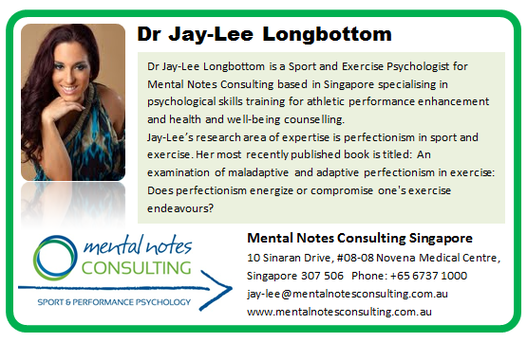|
Recently I attended an international psychology conference held in Singapore centered on the themes of motivation, self-concept, and identity. Conference goers included Psychologists, Coaches, Researchers, and Educators. Keynote presentations were given by professionals at the top of their field on a world stage. Here are some interesting take home points for those in the business of high performance and individuals striving for excellence, and looking to develop their full potential.  Richard Ryan, the world leader in research on Motivation Theory from the University of Rochester, spoke about coaching and high performance and how to build sustainable forms of motivation.
The key to cultivating Intrinsic motivation is to create habits around the following thought processes and actions on a daily basis:
o Allow for structured self-reflection time that helps you to develop meaningful choices each and every day. This will transpire into meaningful, “purposeful” training habits. o Reduce comparison to others and instead focus intensely on crafting your own path and targets. o Emphasise a focus on mastery of skills, method, and strategy toward success, rather than a primary focus on scores and results. o Have regular discussions with your Coach or Sport Psychologist about your strengths as a player and a person, and create opportunities to utilise them.
o Creating a motivation for high performance solely around regulatory rewards such as, money, fame, or approval from others should be avoided. These sources of motivation can propel individuals to work intensely on occasion; however, these factors should only be seen as secondary sources of motivation called upon from time to time. Unless you are constantly receiving such rewards ALL the time, this form of motivation cannot be sustained and you are likely setting yourself up for tremendous pressure or disappointment.  Felicia Huppert, Director of the Centre for Positive Psychology and Education from The University of Western Sydney presented on skills for well-being that should be a part of our everyday awareness. Huppert currently leads a program designed to train “Mindfulness” skills for enhancing concentration and awareness. · Huppert’s research shows that when individuals experience positive mood in the learning environment they not only generate significantly more ideas but those ideas are far more creative and original. · Huppert concludes that creativity is important for learning and fostering intrinsic motivation. · Great coaches are creative in their approach. In applying these findings to your own game, don’t let strict routine stifle your creativity. Allow for structure and reason but be creative in your approach to training on the course and in the gym every so often. This will inspire insightful brainwaves and planning. Life-Satisfaction Huppert introduced the key ingredients to life-satisfaction with reference to the work of influential researcher and author of “Authentic Happiness”; Martin Seligman. Seligman’s research assessed countless psychosocial factors to deduce FOUR key ingredients to life-satisfaction, which he refers to as the “PERMA” model. Positive emotion Relationships Meaning Accomplishment In order to cultivate the PERMA model in your life focus on these five simple yet crucial approaches to enhancing well-being: · Connect · Be active · Take notice – reflect/ be aware/practice focused breathing or meditation. · Give · Keep improving One Step Forward: Identify ONE approach from the list and create ONE new opportunity to focus on this well-being shaper in your life or work TODAY. If you would like to learn more about how to craft your individual strategies in the pursuit of excellence in career or life, a Mental Notes Consultant is here to help.
MissB Positive
24/10/2013 05:15:11 am
Very interesting read. Thank you for the information and tips. regards MissB & MissSM Comments are closed.
|
Archives
June 2019
|
Proudly Supported By
Copyright © 2011 - 2018 Pro Tour Golf College
Website Managed By Golf Performance Media
All Rights Reserved
Website Managed By Golf Performance Media
All Rights Reserved


 RSS Feed
RSS Feed



